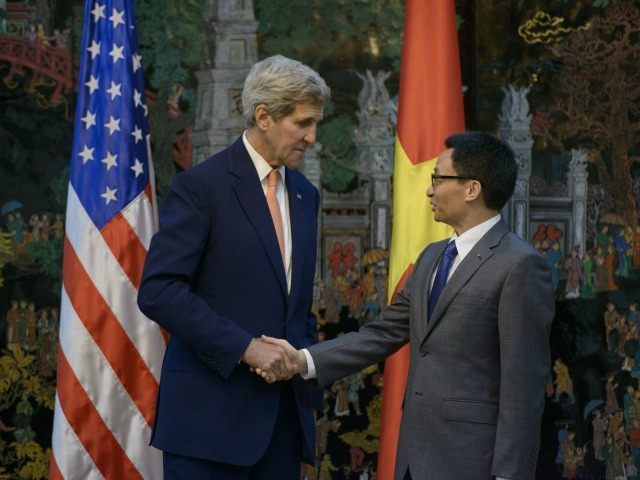The relationship between Vietnam and China is strained over Beijing’s aggressive assertion of its maritime territorial claims, pushing Vietnam’s Communist Party toward an old enemy, the United States, The Washington Post (WaPo) reports.
U.S. officials have warned China against its territorial claims and the militarization of disputed islands in the South China Sea.
“To win friends and open new markets for Chinese companies, Beijing is offering its Asian neighbors tens of billions of dollars in loans and investment. But in Vietnam, the effort is falling flat,” reports the Post.
“China’s aggressive assertion of its maritime territorial claims has alienated many here, and President Xi Jinping’s grand vision of a new Silk Road with China at its center is greeted with scorn and suspicion rather than excitement,” it adds. “The relationship has turned so bad that Vietnam’s Communist Party is tilting more and more toward an old enemy, the United States. And when Xi paid a state visit to Vietnam last month, you could almost feel the chill.”
Under the idea of re-creating ancient Silk Road trade routes financed by a new Asian Infrastructure Investment Bank, China reportedly wants to assist its fellow Asian countries in building the infrastructure they desperately need to grown their economies.
However, although Vietnam could benefit from China’s financial assistance, it fears a hidden agenda.
“We are quite suspicious because we don’t know the real objective,” Tran Truong Thuy, an expert at the Diplomatic Academy of Vietnam, a Foreign Ministry think tank, told the Post. “Behind its Maritime Silk Road, China can advance its sovereignty propaganda.”
Vietnam has joined the Asian Infrastructure Investment Bank, but has kept away from the Silk Road plan.
“The most dramatic recent break in the relationship between Beijing and Hanoi came in May 2014, when China towed a $1 billion oil rig close to the Paracel Islands, in South China Sea waters that Vietnam considers part of its exclusive economic zone,” notes WaPo.
“Deadly riots broke out in Vietnam in which Chinese and Taiwanese factories were attacked. There was a call for an emergency meeting of the Communist Party’s Central Committee to discuss forming an alliance with the United States — a radical strategic change for a country whose disdain for military partnerships is a central foreign policy tenet, said Carl Thayer, a Vietnam expert at the University of New South Wales,” it adds. “President Obama’s top adviser for Asia, Evan Medeiros, was even invited to Vietnam that July to discuss deepening ties.”
China ended up removing the oil rig in July 2014 and the emergency meeting of the Communist Party’s Central Committee never came to fruition.
“Nevertheless, an improving relationship with the United States received further impetus,” reports the Post.
“In the past 12 months, eight of Vietnam’s 16 Politburo members have visited Washington, while half a dozen Cabinet-level U.S. officials have traveled the other way,” it adds.
In July, President Obama, who is expected to visit Vietnam in 2016, received Vietnamese Communist Party leader Nguyen Phu Trong in the Oval Office.
“In October 2014, the United States partially relaxed an arms embargo on Vietnam and is helping Hanoi improve its coast guard capabilities to counter China’s growing presence in the South China Sea,” points out the Post.
“But the clearest indication of rapprochement between Hanoi and Washington has been Vietnam’s inclusion in the Trans-Pacific Partnership, a U.S.-led 12-nation regional trade deal that excludes China,” it adds. “That deal, Vietnam hopes, will help reduce its economic dependence on China, with which it runs a large and growing trade deficit.”
Wounds of the intense border war in 1979 that left tens of thousands dead are reportedly freshers than the much deadlier “American war.”
The strategic shift towards the United States is “grounded in public opinion, where fears of Chinese domination are deeply ingrained and are traced back to occupation by imperial China in ancient times,” reports the Post.
The people of Vietnam are considered to be among America’s greatest fans and China’s foremost skeptics, according to Pew Research surveys.
According to the surveys, 78 percent of the Vietnamese hold a favorable view the United States, compared with only 19 percent for China.
However, the Post does acknowledge that “Vietnam knows it needs good relations with China: History and geography dictate that it cannot afford to make Beijing an enemy. Vietnam will not turn its back on Chinese investment, but it will pick and choose carefully, and it certainly does not trust China’s intentions.”

COMMENTS
Please let us know if you're having issues with commenting.